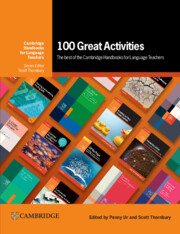Foreword
Published online by Cambridge University Press: 14 March 2024
Summary
The Handbooks series first saw the light of day at a high-level meeting in the late 1970s. To be precise, at 8,230 feet above sea level. My friend Adrian du Plessis and I were on a walking trip in the French Alps. Adrian had been recently appointed by CUP to establish an ELT list; I was one of his new authors. Towards the end of the trip we were overtaken by storms, and had to spend two days in a mountain hut until the weather eased. In the intervals between eating and sleeping, we did a good deal of talking. After exhausting the obvious topics – early lives, education, girlfriends, health, wives, children, travel, favourite writers, etc. etc. – we were driven back to talking about work, a subject which we had been avoiding throughout the trip. We began discussing possible future titles for Adrian's list, and this led on to the notion of a comprehensive range of books covering all the main areas of interest to language teachers. And so the series was born.
The wind finally dropped, and we headed back downhill to the world of work. Memories of the mountains faded into the background, but the series idea remained very present, and Adrian and I had several lower-level meetings to firm up our ideas. We saw the potential series as occupying a middle ground for language teachers. There were plenty of books around introducing teachers to applied linguistics, and any number of recipe books with ideas for one or other kind of classroom activity. But at the time there was comparatively little to bridge the gap between the academic and the purely practical. We envisaged a set of books written by and for practitioners, which would introduce valuable activities framed in general principles that teachers could build on, without going so far up the theoretical scale as to lose touch with the classroom.
It was a very ambitious project. We drew up a list of the main topics we felt we should cover – grammar, vocabulary, pronunciation, the traditional ‘four skills’, and their subdivisions – and started exploring ways of tracking down suitable authors. Like all ambitious projects, it didn't work out quite as we had expected, and we found ourselves becoming reactive rather than proactive. If we failed to find an author for one topic, someone magically turned up for another, through a recommendation or by pure chance.
- Type
- Chapter
- Information
- Publisher: Cambridge University PressPrint publication year: 2024

